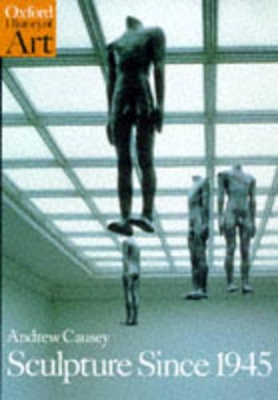History of Art S.
1 total work
Since 1945 the modern revolution in sculpture has gathered pace, and sculpture has now ceased to be the fixed category it once was. In recent decades the modernist idea of sculpture across the UK, America, and Europe, has been challenged, and issues such as nationalityand politics have been brought in to the arena of public discussion.
In this ground-breaking account of the development of post-War sculpture Andrew Causey examines innovative and avant-garde works in relation to contemporary events, festivals, commissions, the marketplace, and the changing functions of museums. He explores the use of everyday objects and the importance of sculptural context, discussing figurative and non-figurative works, Anti-form, Minimalism, experimental form, Earth Art, landscape sculpture, installation, and Performance Art. The holistic picture of post-War sculpture which emerges establishes for the first time the key events and themes round which future debate will centre.
From the pre-publication reviews:
Andrew Causey weaves his way adroitly through the labyrinth of post-War sculpture ... No one else has charted the territory so comprehensively |s Professor Stephen Bann, University of Kent at Canterbury
stimulating and persuasive ... balances a searching analysis of the impact of institutional change, issues of sites and environment, and key critical debates with revealing commentaries on individual artists and works of art ... a discerning guide for anyone interested in contemporary art and culture. |s Elizabeth Cowling, University of Edinburgh
a clear guide to the various directions of sculpture and the work of sculptors in the years when modern sculpture has begun to stand in its own right as a major art form. |s Sir Anthony Caro, Sculptor
In this ground-breaking account of the development of post-War sculpture Andrew Causey examines innovative and avant-garde works in relation to contemporary events, festivals, commissions, the marketplace, and the changing functions of museums. He explores the use of everyday objects and the importance of sculptural context, discussing figurative and non-figurative works, Anti-form, Minimalism, experimental form, Earth Art, landscape sculpture, installation, and Performance Art. The holistic picture of post-War sculpture which emerges establishes for the first time the key events and themes round which future debate will centre.
From the pre-publication reviews:
Andrew Causey weaves his way adroitly through the labyrinth of post-War sculpture ... No one else has charted the territory so comprehensively |s Professor Stephen Bann, University of Kent at Canterbury
stimulating and persuasive ... balances a searching analysis of the impact of institutional change, issues of sites and environment, and key critical debates with revealing commentaries on individual artists and works of art ... a discerning guide for anyone interested in contemporary art and culture. |s Elizabeth Cowling, University of Edinburgh
a clear guide to the various directions of sculpture and the work of sculptors in the years when modern sculpture has begun to stand in its own right as a major art form. |s Sir Anthony Caro, Sculptor
